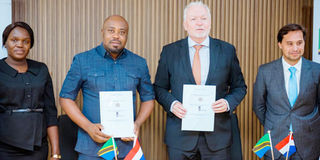Tanzania, Netherlands sign MoU to boost horticultural exports

The ambassador of the Kingdom of the Netherlands in Tanzania, Wiebe de Boer (second right), and the Permanent Secretary in the Ministry of Agriculture, Gerald Mweli (second left), hold documents after signing a MoU on cooperation to strengthen electronic certification (E-cert) for sanitary and phytosanitary processes for the horticultural sector in Tanzania. Others in the photo are the Netherlands Agricultural Councillor for Kenya and Tanzania, Mr Bart Pauwels (right), and the Legal Officer from the Ministry of Agriculture, Ellen Rwijage (left). The signing ceremony took place on Tuesday in Dodoma. PHOTO | COURTESY
What you need to know:
- The two countries signed a Memorandum of Understanding (MOU) that details specific areas of cooperation to enhance the acceptability of Tanzania’s horticultural products in the global market
Dar es Salaam. Tanzania and the Netherlands have agreed to work together to strengthen electronic certification (E-cert) for sanitary and phytosanitary processes in the Tanzanian horticultural sector.
To that end, the two countries signed a Memorandum of Understanding (MOU) that details specific areas of cooperation to enhance the acceptability of Tanzania’s horticultural products in the global market.
In the MoU signing ceremony at the Ministry of Agriculture in Dodoma on Tuesday, Tanzania was represented by the Permanent Secretary Gerald Mweli and Ambassador Wiebe de Boer on behalf of the Ministry of Agriculture, Nature and Food Quality of the Netherlands. The signing was witnessed by the regional agricultural counsellor from the Netherlands Embassy, Mr Bart Pauwels, and representatives from the Tanzania Horticultural Association (TAHA).
The aim of the cooperation is to create efficiency in agricultural trade for more job creation and increased foreign earnings.
The signed MoU will be implemented by the National Plant Protection Organizations (NPPOs), the Tanzania Plant Health and Pesticide Authority (TPHPA), and the Netherlands Food and Consumer Product Safety Authority (NVWA).
This comes as the horticultural sector in Tanzania has shown tremendous growth over the last three decades, becoming one of the major foreign exchange earners.
Reports indicate that horticulture exports accounted for a significant portion of total export value, amounting to $779 million in 2019. Currently, the sector is the main source of livelihood for about 4.5 million farmers, comprising both small and large-scale farmers, of whom the majority are women and youth.
According to the parties’ agreement, the export process of horticultural produce required phytosanitary certification by the Tanzanian Plant Health Service (PHS).
This, they say, is a ‘paper-driven’ process that involves attestation by competent inspectors and represents guarantees (safeguards) to the importing countries’ competent authorities.
They said a phytosanitary certificate accompanies an export consignment to the port of entry of the importing country and therefore acts as a passport to the product.
One of the limitations of a paper phytosanitary certificate is that it is prepared manually, which accounts for a significant portion of the time spent by phytosanitary inspectors in their daily work.
Speaking during the event, the Netherlands Ambassador to Tanzania, Mr de Boer said the Netherlands shared knowledge, expertise, technologies, and innovations for sustainable horticultural trade to meet the growing demand for food in Tanzania and the region.
“Tanzania and the Netherlands have a long-standing cooperation that spans over 40 years. There are about 80 Dutch companies operating in Tanzania; 70 percent have invested in the agricultural sector, the majority of which are in the horticultural sector,” he noted.
TPHPA issues a number of certificates annually, and the time spent on their manual writing and signing was significant.
Also, paper certificates represent permanent records that cannot be corrected in the event a mistake has been made in their entry or if the characteristics of the export consignment change during the export process.
Such a change may be occasioned by the need to change the amount of produce to be exported due to changes in cargo space, which happens quite often during routine export operations.
Since a paper certificate accompanies a consignment during export, it is difficult for port officials of an importing country to pre-clear a consignment of known history before its arrival, and this results in unnecessary delays at ports, even for routine cargo.





